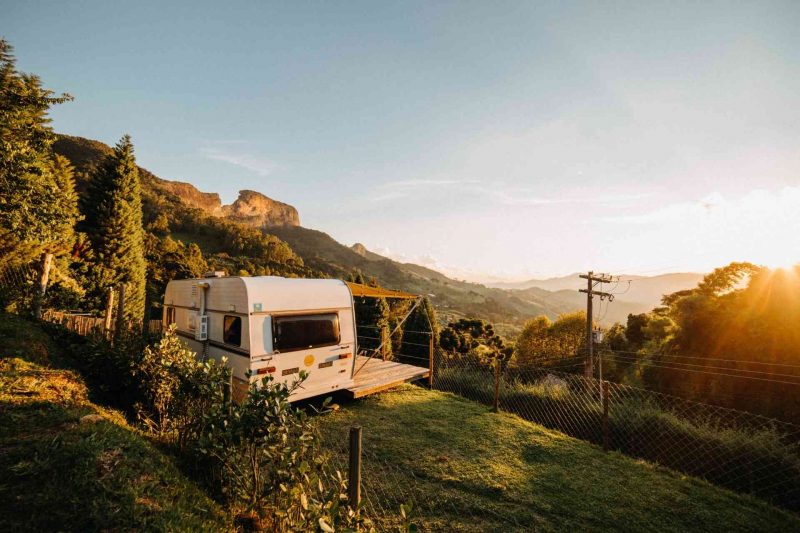Owning land can grant you many freedoms. However, that doesn’t mean you can do just anything you want with it. With the massive boom in the RV industry in recent years, many RV owners are considering moving into their RVs and living on land they own.
However, using your land how you see fit isn’t a freedom that everyone has. If you’re wondering if you can live in an RV on your land, keep reading! We’ll share what you need to know to help you avoid a costly mistake.

Can You Permanently Live in an RV?
There is a large population of RVers who live in their RVs full-time. Scrolling through #rvlife will reveal that some RVers live more luxurious lives in an RV than many enjoy in a typical residential home.
What RVs lack in space, they make up in the freedom to choose where you’ll set up camp and spend your time. You can travel in your RV by the seasons and enjoy beautiful weather all year. This might be an appealing option the next time you have to shovel snow off the driveway and sidewalks outside your home.
If the idea of constantly traveling and living in an RV isn’t appealing, there are options to stay in one spot. You can find long-term sites at RV parks and other parks where you can set up your RV for weeks, months, or even years. There’s even the potential to purchase land and live there in your RV.
HOT TIP
Here’s what new full-time RVers really think of RV life!
Can You Live in an RV on Your Own Land?
Rules and regulations regarding land use will vary from one location to the next. What’s legal in one city or county could be different in a neighboring area.
You’ll want to check your local rules and regulations before purchasing any land to live in your RV. We have heard horror stories of RVers purchasing land, parking their rigs, and receiving a letter from the local code enforcement within days or weeks informing them that they were violating a local code or ordinance.
Some locations do not see RVs as residential dwellings. As a result, you may not get water, electricity, or other utilities at a specific location.

However, you may be able to install a tiny home or other dwellings that meet the legal requirements. You could use the tiny house and RV for maximum comfort while living off your land.
While there are stricter rules and regulations in some locations, there are also some more hospitable areas. Many rural areas provide more space, privacy, and the freedom to use the land.
If you don’t want someone telling you how to live, you may want to start your search in rural locations and avoid urban areas as much as possible.
Which States Allow You to Live in an RV?
Most states allow RVers to live in an RV on their land, but the requirements do vary. Some will require a septic tank, electricity, or other utilities RVers must set up for extended periods.
Some of the most friendly states for living in an RV include Washington, South Dakota, Nevada, Florida, Texas, Arizona, Colorado, California, New York, and Pennsylvania.
Keep in mind, cities or counties might have different restrictions than the state itself. You’ll likely run into more legal issues at the city, county, or other local levels than at the state level. Don’t forget that the dreaded HOA president and the board may be able to say you can’t live in an RV on the land too.
Is Living in an RV Cheaper Than a House?
Living in an RV can be cheaper than living in a house. However, it primarily depends on your standard of living and how you plan to stay in your RV.
Typically, stationary RV living will be one of the cheapest options. You can find some cost-effective RV or trailer parks offering budget-friendly prices for long-term stays. However, living in an RV isn’t always cheaper.
One of the things many people love about living in an RV is that they have more freedom to move their home when and where they want. If you’re planning to move frequently, you’ll not only pay more at RV parks and other campgrounds, but you’ll have to consider the other expenses in moving it.
You’ll need a capable vehicle to tow it safely, which won’t be cheap. In addition, you’ll use a high amount of fuel in the process.
If you enjoy luxurious living at an RV resort, you can easily spend $2,000 to $3,000 monthly on RV sites as you move between resorts. So while RV living can be cost-effective, it can also be expensive.
How Much Does It Cost Monthly to Live in an RV?
The monthly costs for living in an RV will vary greatly depending on your situation. You’ll likely still have the standard utilities, food, and entertainment expenses.
However, you’ll also have to consider the costs of your RV, where you’re parking it, and if you’ll need a beefy truck to tow it. RV and truck payments can be costly if you have to finance them. Some RVers spend $1000+ on the fees for their tow vehicle and $300 to $500+ per month on their RV. The expenses will vary depending on your credit and the loan terms.

Many full-time RVers have shared their monthly budgets and the various expenses of the RV lifestyle on social media. Typically, they estimate they spend anywhere from $2,000 to $3,000 per month on the lifestyle. These costs can differ considerably based on where you’re staying, how many people are in your family, and how you spend your time.
What Is a Good Size RV to Live In?
If you’re planning to live in an RV, you’ll want to ensure you have plenty of space. A family living in their RV will require much more space than an individual.
Typically, an individual can get by with a relatively small 18 to 22-foot RV. On the other hand, families will likely want to look at 27 to 40-foot-long RVs. Families may wish for a designated bunkhouse or even an additional bathroom to make life more comfortable and less chaotic.
You also want to consider how you plan to use your RV. If you plan to travel while living in it, a more extended RV won’t be as easy to maneuver, and you may have trouble finding a spot to park it. So find a good balance between the interior space and mobility.
How Do I Buy Land and Live in an RV?
First, find an area that you think would be a great place to live in your RV. You want to consider whether the site is homelike and check the weather.
Areas with extreme winters and summers can be very challenging in an RV. There are some things you can do to still be comfortable in your rig during these conditions, but it will likely involve some modifications to your rig.
Once you have a list of possible places to live, you should start researching the local city and county ordinances. You can contact those in charge of the zoning and other building requirements for the city and county. If they don’t have the information, they’ll likely point you in the right direction.
If everything checks out, you can start searching for available land plots for sale in the area. You can contact a local real estate agent to help with the process. They’ll have access to tools and resources that can help make it easy to narrow down your search. They’ll also be able to help guide you through the entire transaction of acquiring the land.
Once you sign on the dotted line for the property, you can start transforming it into the perfect RV spot for you and your RV. Whether you’re looking to create a full hook-up glamping experience or a place to park between adventures, your creativity and budget are the only things standing in your way.
Is Living in an RV on Your Own Land Worth It?
If you own land in an area that allows you to live in your RV, it’s worth it. You can save a tremendous amount of money that you can use for your next big project. Whether you want to save for retirement, buy a house, or enjoy some privacy, living in an RV on your land can make it happen.
If you could live full-time in an RV, where would you like to settle down?
If You Want the Latest Travel News, Join Our Mailing List
Don’t rely on biased RV industry news sources to keep you informed. Stick with Nomadic News. We publish articles and breaking stories that matter to you every weekday.










